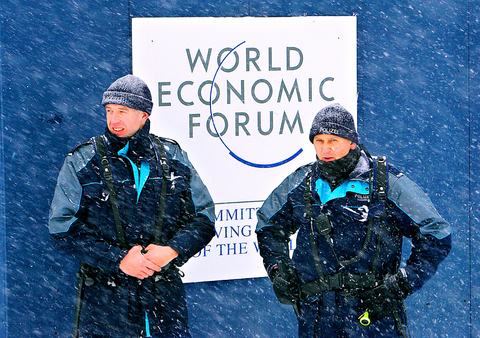Company chiefs from around the world are brimming with confidence about their business prospects over the coming year but divided about the impact of climate change, a survey said yesterday.
Ninety-two percent of 1,100 chief executives in 50 countries were confident about their company's revenue growth this year, according to the annual survey by auditors PricewaterhouseCoopers.
The survey released hours before the opening of the World Economic Forum's annual meeting of global business leaders and politicians indicated that confidence levels were undiminished over the longer term.

PHOTO: AP
Top-rated growth areas were rapidly emerging economies, like Brazil, Russia, India and China, and other developing countries.
Some 40 percent identified climate change as a potential obstacle to business growth, but the survey revealed a wide degree of divergence in attitudes between different parts of the world.
While 58 percent of chief executives in the Asia Pacific region pinpointed the threat of climate change, just 18 percent of their counterparts in the US felt the same way.
Overall some 59 percent did not feel concerned by global warming's impact on their business.
PricewaterhouseCoopers' report on the survey said that systemic risks like climate change or a pandemic were generally lower down the list than financial or economic ones, partly because chief executives felt powerless.
"Our experience suggests ... that it reflects a sense of futility among managers as they face a set of nearly insurmountable challenges," the report said.
However, Pricewaterhouse said the issue was beginning to bite, as a growing number of chief executives indicated that they were turning to public-private sector partnerships to mitigate climate change.
The top five threats to business growth in the survey were over-regulation (78 percent), lack of skills (72 percent), low cost competition (66 percent), energy prices (62 percent) and commodity prices.

SECURITY: As China is ‘reshaping’ Hong Kong’s population, Taiwan must raise the eligibility threshold for applications from Hong Kongers, Chiu Chui-cheng said When Hong Kong and Macau citizens apply for residency in Taiwan, it would be under a new category that includes a “national security observation period,” Mainland Affairs Council (MAC) Minister Chiu Chui-cheng (邱垂正) said yesterday. President William Lai (賴清德) on March 13 announced 17 strategies to counter China’s aggression toward Taiwan, including incorporating national security considerations into the review process for residency applications from Hong Kong and Macau citizens. The situation in Hong Kong is constantly changing, Chiu said to media yesterday on the sidelines of the Taipei Technology Run hosted by the Taipei Neihu Technology Park Development Association. With

CARROT AND STICK: While unrelenting in its military threats, China attracted nearly 40,000 Taiwanese to over 400 business events last year Nearly 40,000 Taiwanese last year joined industry events in China, such as conferences and trade fairs, supported by the Chinese government, a study showed yesterday, as Beijing ramps up a charm offensive toward Taipei alongside military pressure. China has long taken a carrot-and-stick approach to Taiwan, threatening it with the prospect of military action while reaching out to those it believes are amenable to Beijing’s point of view. Taiwanese security officials are wary of what they see as Beijing’s influence campaigns to sway public opinion after Taipei and Beijing gradually resumed travel links halted by the COVID-19 pandemic, but the scale of

A US Marine Corps regiment equipped with Naval Strike Missiles (NSM) is set to participate in the upcoming Balikatan 25 exercise in the Luzon Strait, marking the system’s first-ever deployment in the Philippines. US and Philippine officials have separately confirmed that the Navy Marine Expeditionary Ship Interdiction System (NMESIS) — the mobile launch platform for the Naval Strike Missile — would take part in the joint exercise. The missiles are being deployed to “a strategic first island chain chokepoint” in the waters between Taiwan proper and the Philippines, US-based Naval News reported. “The Luzon Strait and Bashi Channel represent a critical access

Pope Francis is be laid to rest on Saturday after lying in state for three days in St Peter’s Basilica, where the faithful are expected to flock to pay their respects to history’s first Latin American pontiff. The cardinals met yesterday in the Vatican’s synod hall to chart the next steps before a conclave begins to choose Francis’ successor, as condolences poured in from around the world. According to current norms, the conclave must begin between May 5 and 10. The cardinals set the funeral for Saturday at 10am in St Peter’s Square, to be celebrated by the dean of the College